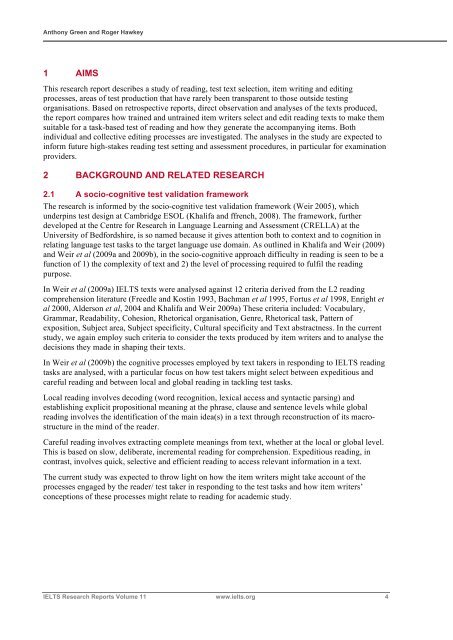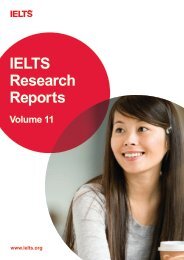An investigation of the process of writing IELTS Academic Reading ...
An investigation of the process of writing IELTS Academic Reading ...
An investigation of the process of writing IELTS Academic Reading ...
Create successful ePaper yourself
Turn your PDF publications into a flip-book with our unique Google optimized e-Paper software.
<strong>An</strong>thony Green and Roger Hawkey<br />
1 AIMS<br />
This research report describes a study <strong>of</strong> reading, test text selection, item <strong>writing</strong> and editing<br />
<strong>process</strong>es, areas <strong>of</strong> test production that have rarely been transparent to those outside testing<br />
organisations. Based on retrospective reports, direct observation and analyses <strong>of</strong> <strong>the</strong> texts produced,<br />
<strong>the</strong> report compares how trained and untrained item writers select and edit reading texts to make <strong>the</strong>m<br />
suitable for a task-based test <strong>of</strong> reading and how <strong>the</strong>y generate <strong>the</strong> accompanying items. Both<br />
individual and collective editing <strong>process</strong>es are investigated. The analyses in <strong>the</strong> study are expected to<br />
inform future high-stakes reading test setting and assessment procedures, in particular for examination<br />
providers.<br />
2 BACKGROUND AND RELATED RESEARCH<br />
2.1 A socio-cognitive test validation framework<br />
The research is informed by <strong>the</strong> socio-cognitive test validation framework (Weir 2005), which<br />
underpins test design at Cambridge ESOL (Khalifa and ffrench, 2008). The framework, fur<strong>the</strong>r<br />
developed at <strong>the</strong> Centre for Research in Language Learning and Assessment (CRELLA) at <strong>the</strong><br />
University <strong>of</strong> Bedfordshire, is so named because it gives attention both to context and to cognition in<br />
relating language test tasks to <strong>the</strong> target language use domain. As outlined in Khalifa and Weir (2009)<br />
and Weir et al (2009a and 2009b), in <strong>the</strong> socio-cognitive approach difficulty in reading is seen to be a<br />
function <strong>of</strong> 1) <strong>the</strong> complexity <strong>of</strong> text and 2) <strong>the</strong> level <strong>of</strong> <strong>process</strong>ing required to fulfil <strong>the</strong> reading<br />
purpose.<br />
In Weir et al (2009a) <strong>IELTS</strong> texts were analysed against 12 criteria derived from <strong>the</strong> L2 reading<br />
comprehension literature (Freedle and Kostin 1993, Bachman et al 1995, Fortus et al 1998, Enright et<br />
al 2000, Alderson et al, 2004 and Khalifa and Weir 2009a) These criteria included: Vocabulary,<br />
Grammar, Readability, Cohesion, Rhetorical organisation, Genre, Rhetorical task, Pattern <strong>of</strong><br />
exposition, Subject area, Subject specificity, Cultural specificity and Text abstractness. In <strong>the</strong> current<br />
study, we again employ such criteria to consider <strong>the</strong> texts produced by item writers and to analyse <strong>the</strong><br />
decisions <strong>the</strong>y made in shaping <strong>the</strong>ir texts.<br />
In Weir et al (2009b) <strong>the</strong> cognitive <strong>process</strong>es employed by text takers in responding to <strong>IELTS</strong> reading<br />
tasks are analysed, with a particular focus on how test takers might select between expeditious and<br />
careful reading and between local and global reading in tackling test tasks.<br />
Local reading involves decoding (word recognition, lexical access and syntactic parsing) and<br />
establishing explicit propositional meaning at <strong>the</strong> phrase, clause and sentence levels while global<br />
reading involves <strong>the</strong> identification <strong>of</strong> <strong>the</strong> main idea(s) in a text through reconstruction <strong>of</strong> its macrostructure<br />
in <strong>the</strong> mind <strong>of</strong> <strong>the</strong> reader.<br />
Careful reading involves extracting complete meanings from text, whe<strong>the</strong>r at <strong>the</strong> local or global level.<br />
This is based on slow, deliberate, incremental reading for comprehension. Expeditious reading, in<br />
contrast, involves quick, selective and efficient reading to access relevant information in a text.<br />
The current study was expected to throw light on how <strong>the</strong> item writers might take account <strong>of</strong> <strong>the</strong><br />
<strong>process</strong>es engaged by <strong>the</strong> reader/ test taker in responding to <strong>the</strong> test tasks and how item writers’<br />
conceptions <strong>of</strong> <strong>the</strong>se <strong>process</strong>es might relate to reading for academic study.<br />
<strong>IELTS</strong> Research Reports Volume 11 www.ielts.org 4

















